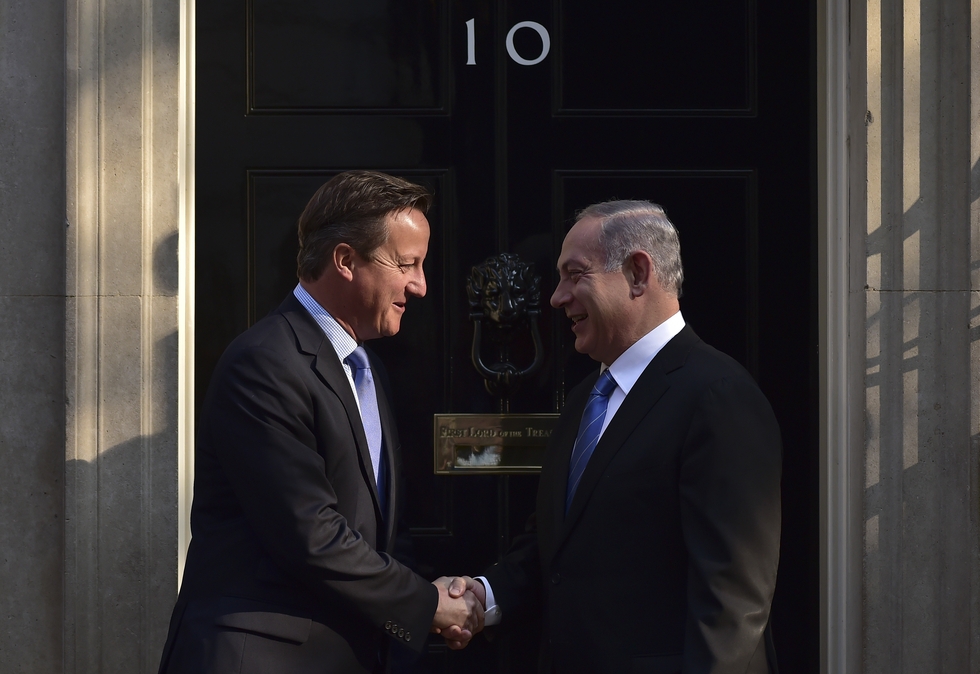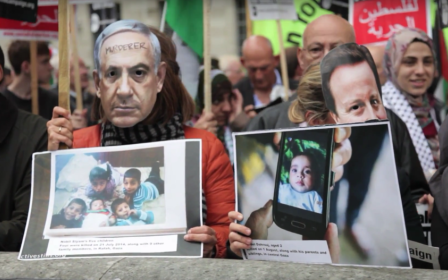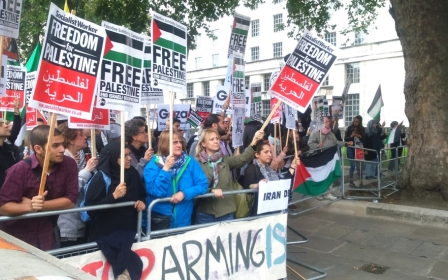Netanyahu seeks UK support against 'militant Islam'

Israeli Prime Minister Benjamin Netanyahu sought Britain's cooperation to "turn back the tide of militant Islam" as he met Prime Minister David Cameron in London on Thursday.
"The Middle East is disintegrating under the twin forces of militant Islam: The militant Sunnis led by ISIS and the militant Shias led by Iran," said Netanyahu as he began talks with Cameron at Downing Street.
"And I believe that we can cooperate in practical ways to roll back the tide of militant Islam both in the Middle East and in Africa altogether."
ISIS is an acronym for the Islamic State militant group, which has seized swathes of Iraq and Syria.
Prior to his visit to London, the Israeli premier blamed Europe's refugee crisis on "militant Islam".
"Because of the onslaught of militant Islam in the Middle East and in Africa, Europe is facing the waves, a tsunami of people tragically fleeing from the worst crimes that humanity has seen since the Holocaust," Netanyahu said.
Three things were on the agenda at the talks, according to Netanyahu: security, peace and technology.
Netanyahu's visit was preceded by clashes between pro-Palestinian and pro-Israeli protesters outside Downing Street on Wednesday.
Police intervened to break up the scuffles as around 500 protesters gathered, waving placards and flags.
More than 108,000 people have signed a petition urging Netanyahu's arrest for war crimes, enough for the issue to be considered for debate in Britain's parliament.
Israel's embassy in London called it a "meaningless publicity stunt".
Britain is pushing for a two-state solution to resolve the Israeli-Palestinian conflict and "will reinforce this message to Mr Netanyahu during his visit," according to an official response to the petition.
Peace talks?
The Israeli leader said he was willing to "immediately" resume negotiations with the Palestinians, "with no conditions whatsoever".
Peace talks between Israel and the Palestinians stalled last year after Israel failed to release several pre-Oslo Accord prisoners and continued to expand illegal settlements in the occupied West Bank.
The negotiations then collapsed shortly after Hamas, which rules Gaza, and Fatah, which rules the West Bank, signed a unity deal that was sharply opposed by Israel. The deal has since all but collapsed, with speculation circulating that Israel could be trying to cut a separate deal with Hamas, and shun Fatah.
Despite settlements being seen as illegal under international law, Israel continued to build in the West Bank during the latest round of talks, headed by the Americans. Thus far, the Palestinians have insisted that they will only commence talks if settlements are stopped, something the Israelis have proved loathed to do.
On Thursday, PLO Executive Committee member and veteran Palestinian negotiator Hanan Ashrawi told MEE that Netanyahu's suggestion was "absurd" and his willingness to put aside pre-conditions a euphemism for Palestinians to accept his conditions.
"Netanyahu always wanted negotiations forever, to buy more time, to create more facts, to avoid any kind of accountability or international intervention just as long as the process goes on forever," Ashrawi said.
"He creates facts on the ground that totally negate the objectives and the foundations of the talks because it allows him to continue with his impunity, to continue with his legal and political and economic cover, reaping the rewards of being an oppressor while actually stealing Palestinian land and resources, expanding settlements, annexing Jerusalem and Area C, doing all of the illegal things that he’s very good at doing, without out any kind of intervention or accountability."
"I think it is deceptive, it is manipulative and it’s about time that he stops this dangerous game," she said.
Daniel Levy, head of the Middle East and & North Africa programme at the European Council on Foreign Relations, wrote ahead of the meeting that despite British policy against settlements and occupation, British leadership in labelling settlement products and the government's guidelines for British companies last year that outlined the risks of doing business with settlement-based entities, momentum has been lost.
"Cameron has become increasingly lame in his policies and pronouncements on Israeli treatment of Palestinians and undermining of peace and two states, not least during last summer's devastating Israeli military operation against Gaza," Levy wrote.
"Expect more of the same during Netanyahu’s visit. In fact the Palestinians are not even mentioned in the Israeli official background note on the visit, focusing instead on Europe supporting Israel as the only true protection Europe has in the Middle East against surging extremist Islam.”
Cyber technology
Netanyahu is also hoping to boost trade between the UK and Israel, and to promote Israel's cyber surveillance technologies. "The third point is technology – the future belongs to those who innovate," Netanyahu said in the statement.
"Britain and Israel are two great centres of technology. Israel is a global hub of innovation, especially in cyber security. And I think that if we pull our resources together we can offer a better future and great prosperity."
Before boarding the plane to come to the UK, Netanyahu issued a warning to the EU that it risked losing Israeli business if it supported moves to boycott goods produced in illegal settlements on the West Bank.
“Europe should support Israel - not pressure Israel, not attack Israel, but support Israel, which is the only real shield that Europe and the Middle East have against extremist Islam, which is surging,” he told reporters.
Netanyahu's visit to the UK has been controversial, with protests in London and a petition delivered to the Prime Minister's office in Downing Street calling for the Israeli prime minister's arrest receiving more than 100,000 signatures. The authorities declined to act on the petition, arguing that as head of state, Netanyahu enjoys immunity from prosecution.
The meeting with Cameron "sends the signal back home that all is hunky-dory, that Israel's prime minister is a prized guest in Europe's key capitals," Levy said.
"Netanyahu is, as ever, looking for trade-offs, distractions and leverage that will secure his maximalist position against the Palestinians," he added.
New MEE newsletter: Jerusalem Dispatch
Sign up to get the latest insights and analysis on Israel-Palestine, alongside Turkey Unpacked and other MEE newsletters
Middle East Eye delivers independent and unrivalled coverage and analysis of the Middle East, North Africa and beyond. To learn more about republishing this content and the associated fees, please fill out this form. More about MEE can be found here.




